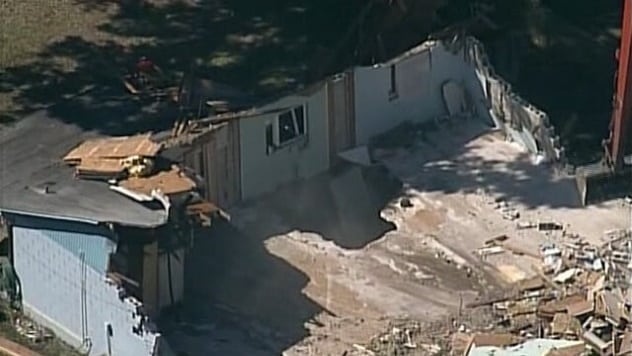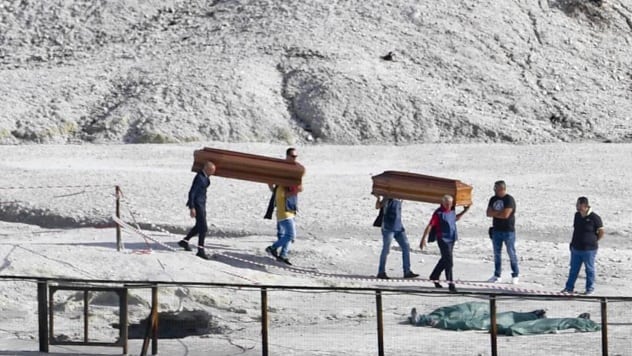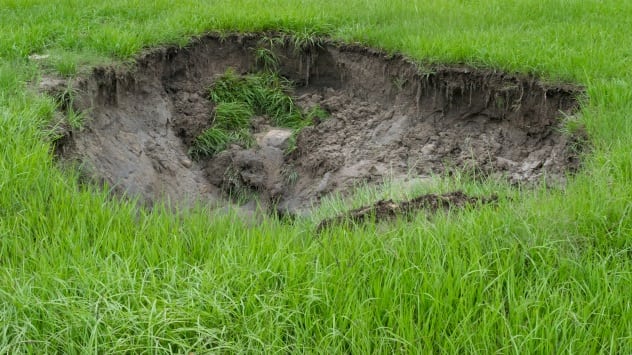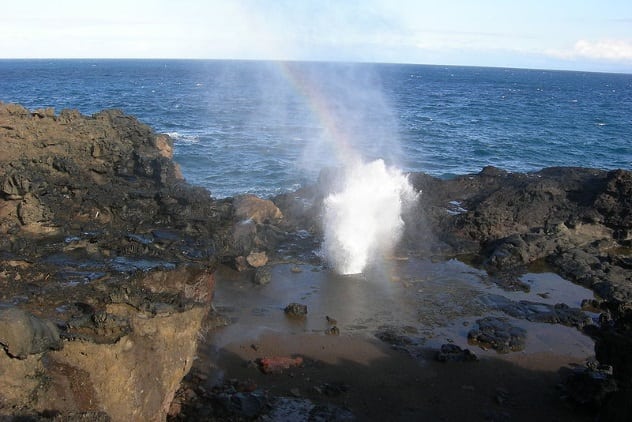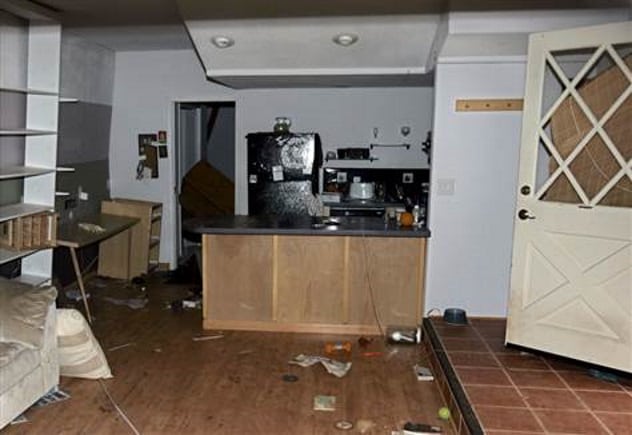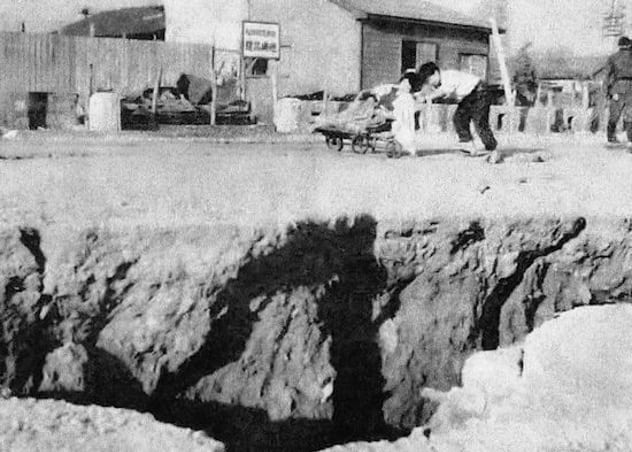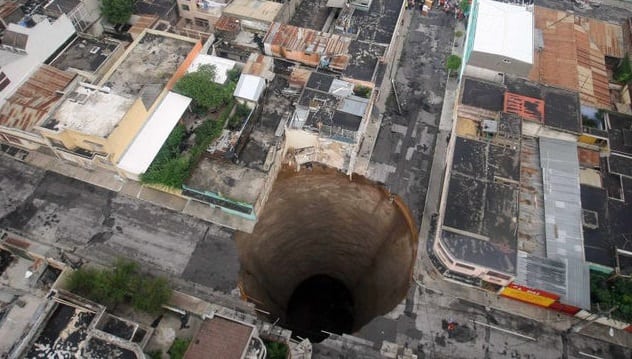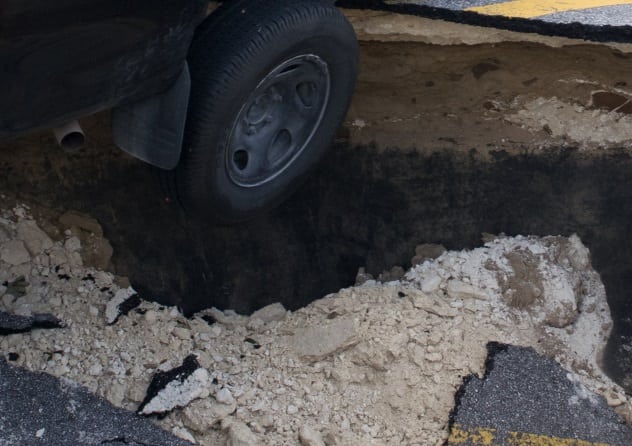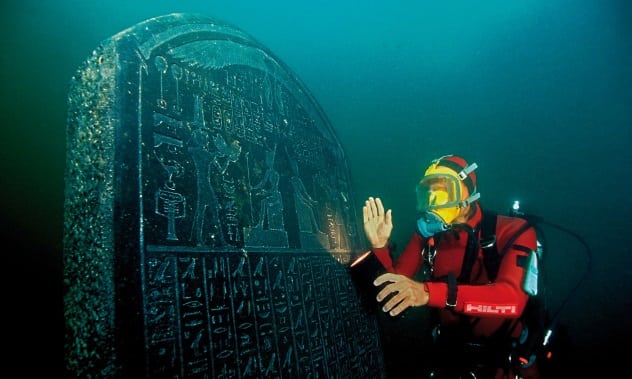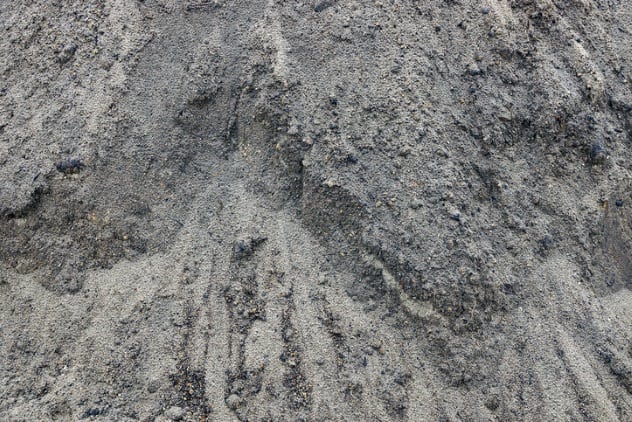Well, it is true; the ground can swallow you as a quick appetizer without warning, but only under certain circumstances. In the following list, we will see ten cases of people being sucked down by a hungry Earth and how they ended up in such situations. As this list will show us, we should watch carefully where we step.
10 A Man Is Swallowed Inside His House While Sleeping
In February 2013, Jeff Bush, 37, was sleeping at his home in Florida when the floor under his bed collapsed and swallowed the man almost instantaneously. Jeremy Bush, his brother, was in another room when he heard a loud noise similar to “a car hitting the house,” followed by the screams of Jeff asking for help from his bedroom. Jeremy went into his brother’s room, seeing only a huge hole where Jeff’s bed was before. Jeremy jumped into the sinkhole without hesitation, trying to save his brother, but it was too late. He couldn’t see Jeff anywhere inside the hole, and Jeremy himself had to be rescued as the hole continued to grow in size. Jeff’s body was never found inside the sinkhole, which reached a depth of 15 meters (50 ft). The other five members of the family who were in the house at the time managed to survive the incident.[2] The house had to be demolished because the ground below was very unstable. All the houses surrounding the site had the same fate. Two years later, the hole opened again in the same place, but by then, there was nothing and no one that could be swallowed by it. The state of Florida has a chronic problem with sinkholes, which open frequently, but it is not common for a person to be swallowed by one of these cavities.
9 A Family Falls Into A Volcanic Crater
A volcanic eruption can kill people with lava, ash, pyroclastic flows, and debris, but now we will see another way: craters. In September 2017, a family consisting of a couple and two children was visiting the Solfatara volcano, near Naples, Italy. According to officials, the 11-year-old son entered a restricted area of the crater, so his parents went after the boy to bring him back. Suddenly, the ground collapsed under the weight of the three family members, and a 3-meter (10 ft) crater opened beneath them. The three people fell into the crater and probably died of asphyxia due to the toxic gases. The other son, seven years old, survived the incident by staying out of the restricted area, after which he ran for help.[3] The soil in the area is fragile, and in addition to the gases, the volcano also releases water vapor at 160 degrees Celsius (320 °F), so falling into one of its craters means an almost certain death.
8 The Hollow Courtyard
A seven-year-old boy was playing with his brother in the courtyard of an apartment complex in North Brunswick, New Jersey, in April 1993. The boy, Kwami Sharif, put his foot into a small hole in the yard when, without warning, the ground collapsed under him.[4] The child fell into a pit 2.4 meters (8 ft) deep, full of tree debris and featuring a thin layer of water at the bottom. Kwami, fully conscious, asked for help to get out of the hole. The boy’s father, the neighbors, and the police all tried to get Sharif out of the cavity, but the ground began to give way again. Then the mud fell incessantly over Kwami until it completely filled the hole. After seven hours of digging, the boy’s body was extracted and taken to a hospital, where his death was confirmed. Sharif was suffocated by the clay that covered him inside the cavity. After an investigation, it was determined that roots and tree branches buried underground caused the courtyard to hollow out, becoming prone to collapse. Although it is believed that the debris was purposely buried by someone, no one was blamed for this accident.
7 The Blowhole That Dragged A Man Into The Ocean
Just to clarify, a blowhole is a rare geological formation in coastal areas which consists of a hole in the ground that connects directly with the ocean. When sea waves begin to erode a cavity under the rocky terrain of the coast, a kind of vertical vent is created through the ground. And with a turbulent sea, air and water are explosively released through the blowhole, as if it were a geyser. The water current through the hole is usually very strong and is capable of swallowing anything—or anyone. In July 2011, a 44-year-old man was dancing around the Nakalele blowhole in Maui when the return of the water current dragged him into the hole. While other tourists looked at the blowhole in horror, the man reappeared for a few seconds with the next wave.[5] But after that, he did not come back anymore. Rescuers searched for the man for three days, but he could not be found. It is presumed that he ended up in the ocean, facing certain death. Blowholes are usually tourist attractions around the world. But this case and the fact that many other people have died in such formations should serve as a warning not to underestimate the force of nature swallowing people.
6 A Gold Mine Becomes Deadly Under A Living Room
Let’s continue with homeowners swallowed inside their property, this time in the state of California. One night in February 2006, a schoolteacher named Jason Chellew was quietly resting in the living room of his house when the floor began to make strange noises. Chellew got up to find the source of the noise, and the ground beneath him sank and swallowed him in a blink. Jason’s wife, who was pregnant at the time, was unharmed, as she was in the bedroom. After two days of hard work, rescuers managed to extract Jason’s body from the hole. Later, another hole with the same characteristics opened 15 meters (50 ft) away from the first one.[6] A team of 100 experts went to Chellew’s house to determine the cause of the fatal accident. The ground beneath the Californian town of Alta has a huge network of tunnels belonging to a 19th-century gold mine. For this reason, it is presumed that rains over the area collapsed part of the mine under Chellew’s house, resulting in the formation of the sinkhole.
5 The Human-Eating Earthquake
The history of cinema is full of movies in which someone dies being engulfed by the Earth during an earthquake. And the truth is that, although unlikely, this situation can happen in real life. Although earthquakes cannot split the ground suddenly like in a movie, if the affected soil meets certain conditions, the Earth can indeed open up. In 1948, a strong earthquake of roughly magnitude 7 struck off the city of Fukui, Japan. According to a firsthand story told by the locals, a woman who was in a rice paddy fell into a crack that opened during the earthquake. The crack opened to a width of 1.2 meters (4 ft), and after the woman fell into it, the fissure closed again, crushing the woman to death. The woman’s husband and children found her body trapped in the crack, with one hand still grabbing rice plants as if trying to save herself.[7] As a curiosity, the damage caused by the earthquake was so great that the Japan Meteorological Agency had to increase its scale of seismic intensity by one level. The results were almost 4,000 deaths and tens of thousands of homeless people.
4 A Neighborhood Sinks Into The Abyss
We have already seen that the Earth has swallowed people inside their houses. So let’s go to the next level: a lot of houses with people inside, being swallowed at the same time. Moreover, we have several situations of that kind. In February 2007, the inhabitants of Guatemala City were terrified to hear a sound similar to a bomb explosion, while some neighbors started shouting, “The electric posts are falling down!” The reason? The ground beneath a neighborhood of the city began to sink, and a dozen houses fell into a huge hole 100 meters (330 ft) deep. Three bodies were found inside the hole and in an adjacent sewage river, corresponding to a family that lived in one of the destroyed houses. Neighbors in the area reported that more people were missing, although it could not be confirmed that this was really the case. Authorities had to evacuate 1,000 people from the site, given the possibility that the ground would continue to collapse. It is believed that the cause of the sinking was a combination of recent rains over the city and the rupture of a sewer pipe under the neighborhood.[8] The truth is that this was far from being a unique case; in 2010, another hole opened five kilometers (3 mi) away from the first one we have just seen. This hole swallowed a three-story building, a house, and a person.
3 A Sinkhole Opens Under A Hotel
Sinkholes exist all over the world, and, along with landslides, they are one of the main ways the Earth can swallow people. The next case has characteristics similar to those of the Guatemalan sinkhole we just saw. In 1993, a parking lot under an Atlanta hotel collapsed and dragged three cars into the resulting pit. Two people who were in the parking lot at the time were also pulled to their death inside the sinkhole. One of the bodies was extracted from the hole, and the other person was found at a distance in a sewer pipe, after being dragged by the water. As happened with the sinkhole in Guatemala, heavy rains caused an old drainage pipe under the parking lot to flood and burst. As a result, the adjacent floor weakened, opening a sinkhole 60 meters (200 ft) in diameter that engulfed the parking lot. However, something particular to this time is that the authorities knew there was a risk that this situation would occur.[9] Still, they did nothing to prevent the collapse, as they underestimated the seriousness of the events.
2 When The Earth Swallowed An Entire City
Many people know about the ancient city of Thonis-Heracleion in Egypt, discovered in 2000 after being underwater for centuries. But what many people do not know is how exactly this city sank. Thonis (Heracleion for the Greeks) was a port city on the Nile River, founded around the eighth century BC. A series of great cataclysms led to Thonis-Heracleion sinking under 10 meters (33 ft) of water by the end of the eighth century AD. There are discrepancies among scientists about whether Heracleion sank due to an earthquake, a series of tsunamis, or a volcanic eruption. But there is something many experts do agree on: the city could have sunk in a single day. Because Thonis-Heracleion was built on soft ground in a delta (properly called deltaic soil), sudden movements beneath the surface caused the city to crumble in a matter of hours. In the process, the buildings above were partially destroyed. If so, perhaps many of the inhabitants of Thonis did not have time to escape. By then, the catastrophe would have already taken thousands of lives in surrounding areas. In the end, the ground beneath the city collapsed, and people died either under the rubble or drowning in the sea. After 1,200 years, Heracleion remains almost intact under the Mediterranean Sea.[10] So it is clear that the city was not destroyed by water or another element, but that the Earth swallowed it.
1 Quicksand That Fooled Little Girls
Chloe Foster and her friend Alyshia Bennett, two girls ten and 11 years old, respectively, made a trip to Charlestown Lake in England in September 2001. While two other friends were picking berries, the girls went into the lake after seeing what seemed to be a patch of dry land in the middle of the water. As they tried to reach it, however, both girls began to sink in what turned out to be quicksand. While Chloe only sank to her waist, Alyshia sank to her chin. The only reason she didn’t sink completely is because the other two friends went to rescue them.[11] From a tree, the boys kept Alyshia afloat for 15 minutes, scooping quicksand away from her mouth so that she could breathe, until firemen arrived and rescued both girls. This is the only story on this list where people managed to survive being swallowed by the Earth. Quicksand is not usually deadly by itself; it traps the victim to a certain point, after which the sediment is too dense for the person to continue sinking. But in this case, the combination of deep quicksands and the size of the girls may have contributed to the almost fatal outcome for this story. In any case, this type of terrain can be deadly, as in the case of two teenagers from Illinois, whose bodies were found buried in a quicksand pit in 1997. Economy student, passionate about Graphic Design, an avid enthusiast of the art of writing.
